International Hotel Management Report: Food and Beverage Operations
VerifiedAdded on 2022/12/17
|17
|5403
|1
Report
AI Summary
This report provides a comprehensive overview of international hotel management, specifically focusing on food and beverage (F&B) operations within the context of the Hilton hotel. It begins with an introduction to hotel operations, highlighting the importance of various departments such as F&B, housekeeping, and front office. The report then delves into the role of information systems in the hotel industry, including transaction processing systems, point-of-sale systems, property management systems (PMS), and global distribution systems (GDS). A significant portion of the report is dedicated to F&B operations, covering topics such as purchasing, menu planning, daily operations, and beverage control. The report emphasizes the importance of food safety, hygiene, and allergen management, discussing potential sources of contamination, hygiene practices for staff, and food safety concerns. Additionally, it examines the impact of food allergies and intolerances, providing insights into the immune response to food constituents. The report concludes by highlighting the key functions and responsibilities of the F&B department in ensuring guest satisfaction and operational efficiency.
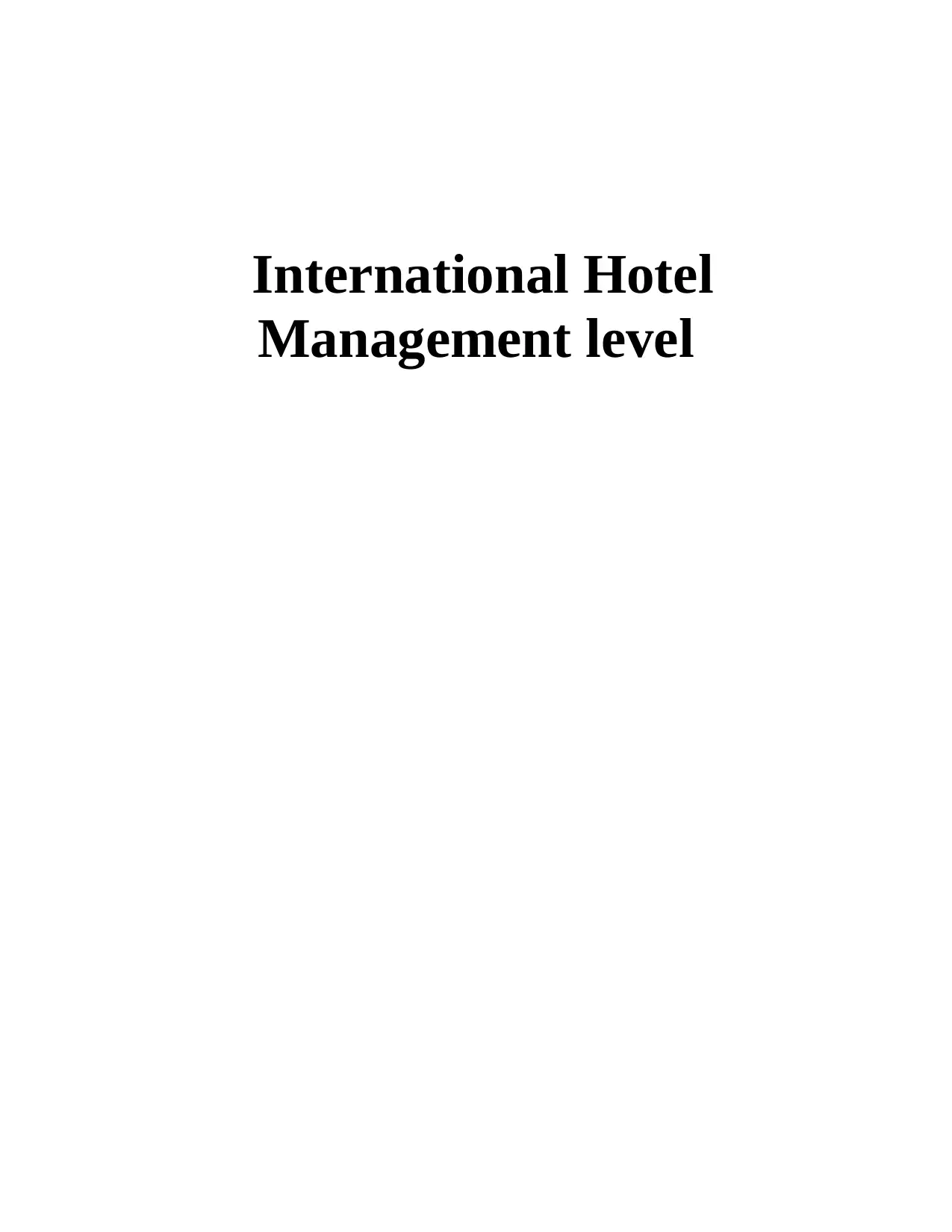
International Hotel
Management level
Management level
Paraphrase This Document
Need a fresh take? Get an instant paraphrase of this document with our AI Paraphraser
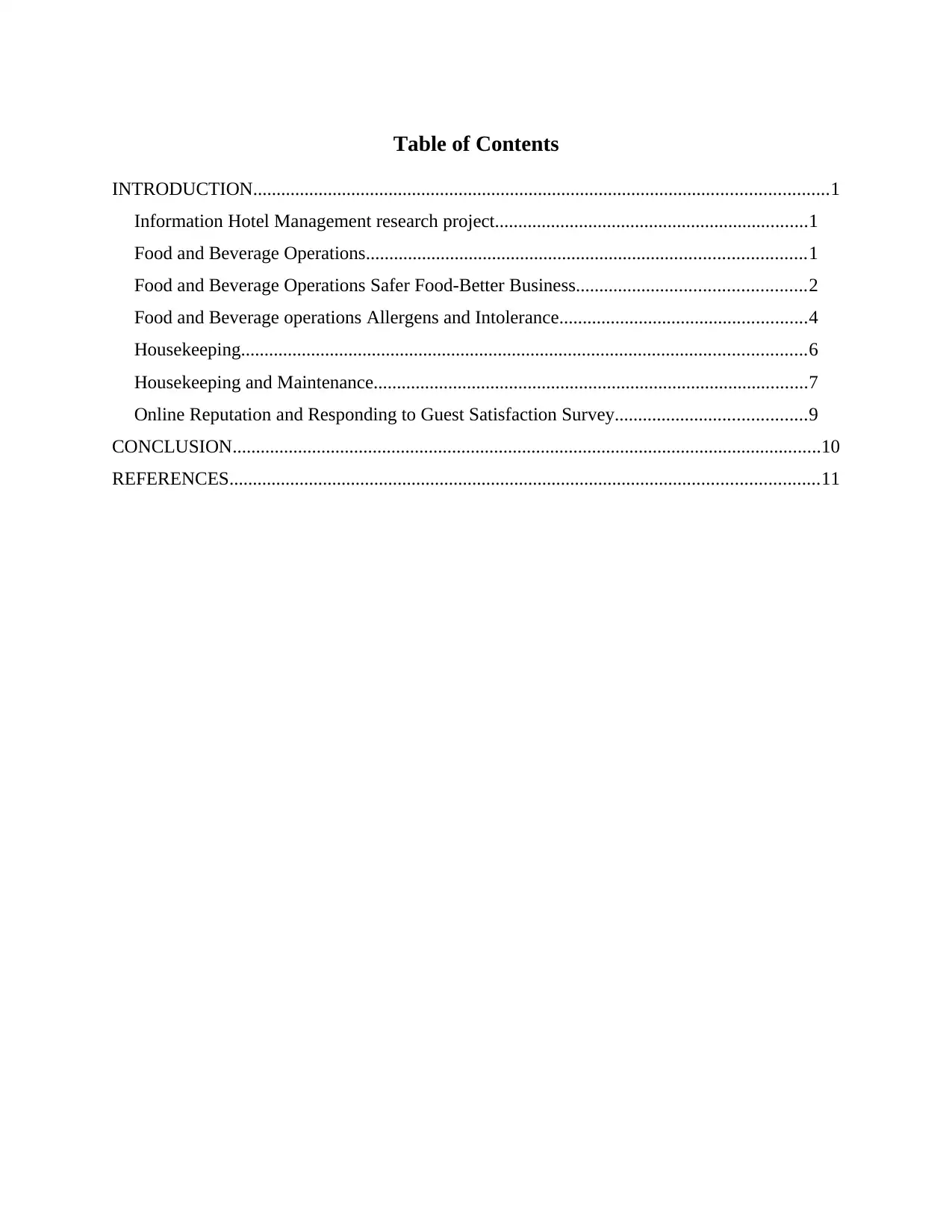
Table of Contents
INTRODUCTION...........................................................................................................................1
Information Hotel Management research project...................................................................1
Food and Beverage Operations..............................................................................................1
Food and Beverage Operations Safer Food-Better Business.................................................2
Food and Beverage operations Allergens and Intolerance.....................................................4
Housekeeping.........................................................................................................................6
Housekeeping and Maintenance.............................................................................................7
Online Reputation and Responding to Guest Satisfaction Survey.........................................9
CONCLUSION..............................................................................................................................10
REFERENCES..............................................................................................................................11
INTRODUCTION...........................................................................................................................1
Information Hotel Management research project...................................................................1
Food and Beverage Operations..............................................................................................1
Food and Beverage Operations Safer Food-Better Business.................................................2
Food and Beverage operations Allergens and Intolerance.....................................................4
Housekeeping.........................................................................................................................6
Housekeeping and Maintenance.............................................................................................7
Online Reputation and Responding to Guest Satisfaction Survey.........................................9
CONCLUSION..............................................................................................................................10
REFERENCES..............................................................................................................................11
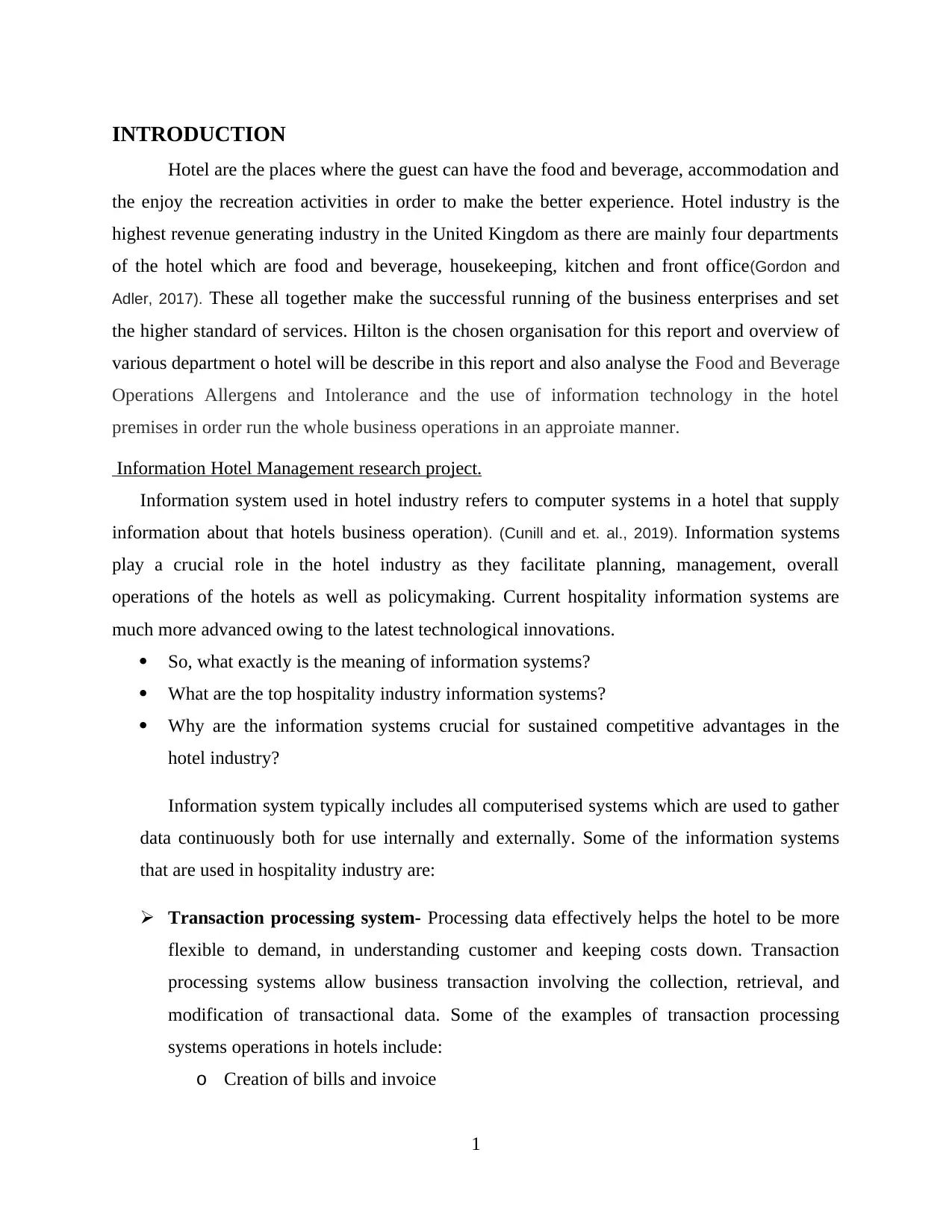
INTRODUCTION
Hotel are the places where the guest can have the food and beverage, accommodation and
the enjoy the recreation activities in order to make the better experience. Hotel industry is the
highest revenue generating industry in the United Kingdom as there are mainly four departments
of the hotel which are food and beverage, housekeeping, kitchen and front office(Gordon and
Adler, 2017). These all together make the successful running of the business enterprises and set
the higher standard of services. Hilton is the chosen organisation for this report and overview of
various department o hotel will be describe in this report and also analyse the Food and Beverage
Operations Allergens and Intolerance and the use of information technology in the hotel
premises in order run the whole business operations in an approiate manner.
Information Hotel Management research project.
Information system used in hotel industry refers to computer systems in a hotel that supply
information about that hotels business operation). (Cunill and et. al., 2019). Information systems
play a crucial role in the hotel industry as they facilitate planning, management, overall
operations of the hotels as well as policymaking. Current hospitality information systems are
much more advanced owing to the latest technological innovations.
So, what exactly is the meaning of information systems?
What are the top hospitality industry information systems?
Why are the information systems crucial for sustained competitive advantages in the
hotel industry?
Information system typically includes all computerised systems which are used to gather
data continuously both for use internally and externally. Some of the information systems
that are used in hospitality industry are:
Transaction processing system- Processing data effectively helps the hotel to be more
flexible to demand, in understanding customer and keeping costs down. Transaction
processing systems allow business transaction involving the collection, retrieval, and
modification of transactional data. Some of the examples of transaction processing
systems operations in hotels include:
o Creation of bills and invoice
1
Hotel are the places where the guest can have the food and beverage, accommodation and
the enjoy the recreation activities in order to make the better experience. Hotel industry is the
highest revenue generating industry in the United Kingdom as there are mainly four departments
of the hotel which are food and beverage, housekeeping, kitchen and front office(Gordon and
Adler, 2017). These all together make the successful running of the business enterprises and set
the higher standard of services. Hilton is the chosen organisation for this report and overview of
various department o hotel will be describe in this report and also analyse the Food and Beverage
Operations Allergens and Intolerance and the use of information technology in the hotel
premises in order run the whole business operations in an approiate manner.
Information Hotel Management research project.
Information system used in hotel industry refers to computer systems in a hotel that supply
information about that hotels business operation). (Cunill and et. al., 2019). Information systems
play a crucial role in the hotel industry as they facilitate planning, management, overall
operations of the hotels as well as policymaking. Current hospitality information systems are
much more advanced owing to the latest technological innovations.
So, what exactly is the meaning of information systems?
What are the top hospitality industry information systems?
Why are the information systems crucial for sustained competitive advantages in the
hotel industry?
Information system typically includes all computerised systems which are used to gather
data continuously both for use internally and externally. Some of the information systems
that are used in hospitality industry are:
Transaction processing system- Processing data effectively helps the hotel to be more
flexible to demand, in understanding customer and keeping costs down. Transaction
processing systems allow business transaction involving the collection, retrieval, and
modification of transactional data. Some of the examples of transaction processing
systems operations in hotels include:
o Creation of bills and invoice
1
⊘ This is a preview!⊘
Do you want full access?
Subscribe today to unlock all pages.

Trusted by 1+ million students worldwide
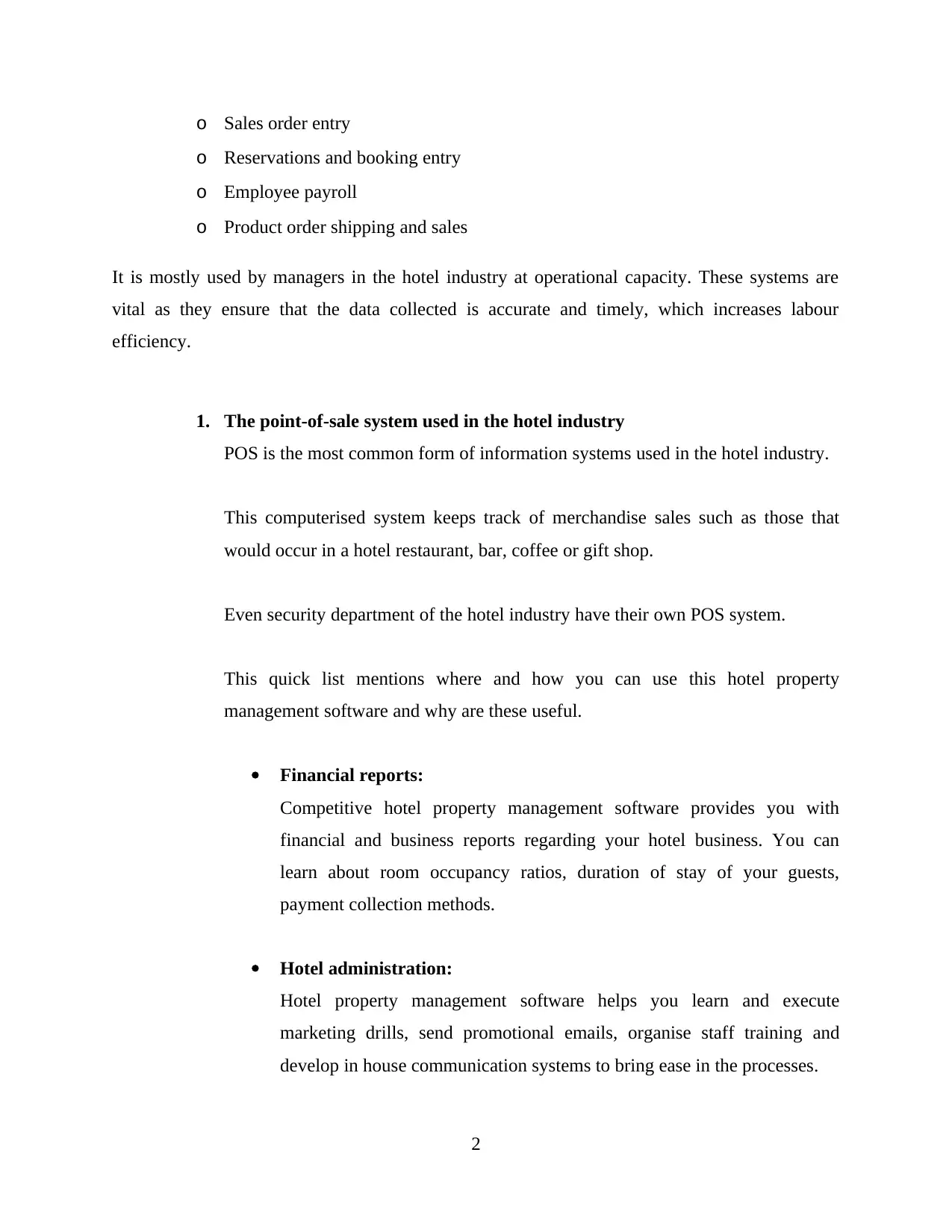
o Sales order entry
o Reservations and booking entry
o Employee payroll
o Product order shipping and sales
It is mostly used by managers in the hotel industry at operational capacity. These systems are
vital as they ensure that the data collected is accurate and timely, which increases labour
efficiency.
1. The point-of-sale system used in the hotel industry
POS is the most common form of information systems used in the hotel industry.
This computerised system keeps track of merchandise sales such as those that
would occur in a hotel restaurant, bar, coffee or gift shop.
Even security department of the hotel industry have their own POS system.
This quick list mentions where and how you can use this hotel property
management software and why are these useful.
Financial reports:
Competitive hotel property management software provides you with
financial and business reports regarding your hotel business. You can
learn about room occupancy ratios, duration of stay of your guests,
payment collection methods.
Hotel administration:
Hotel property management software helps you learn and execute
marketing drills, send promotional emails, organise staff training and
develop in house communication systems to bring ease in the processes.
2
o Reservations and booking entry
o Employee payroll
o Product order shipping and sales
It is mostly used by managers in the hotel industry at operational capacity. These systems are
vital as they ensure that the data collected is accurate and timely, which increases labour
efficiency.
1. The point-of-sale system used in the hotel industry
POS is the most common form of information systems used in the hotel industry.
This computerised system keeps track of merchandise sales such as those that
would occur in a hotel restaurant, bar, coffee or gift shop.
Even security department of the hotel industry have their own POS system.
This quick list mentions where and how you can use this hotel property
management software and why are these useful.
Financial reports:
Competitive hotel property management software provides you with
financial and business reports regarding your hotel business. You can
learn about room occupancy ratios, duration of stay of your guests,
payment collection methods.
Hotel administration:
Hotel property management software helps you learn and execute
marketing drills, send promotional emails, organise staff training and
develop in house communication systems to bring ease in the processes.
2
Paraphrase This Document
Need a fresh take? Get an instant paraphrase of this document with our AI Paraphraser
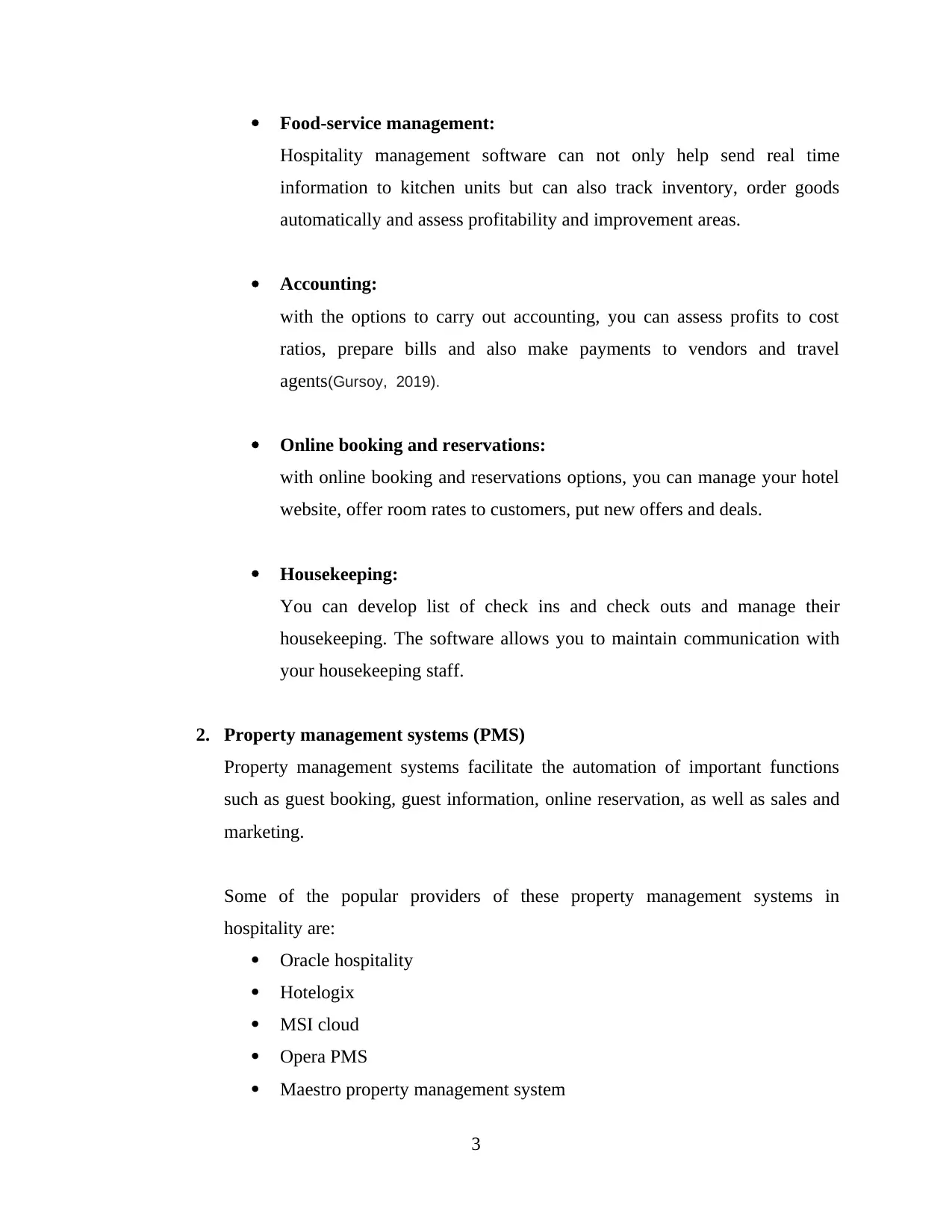
Food-service management:
Hospitality management software can not only help send real time
information to kitchen units but can also track inventory, order goods
automatically and assess profitability and improvement areas.
Accounting:
with the options to carry out accounting, you can assess profits to cost
ratios, prepare bills and also make payments to vendors and travel
agents(Gursoy, 2019).
Online booking and reservations:
with online booking and reservations options, you can manage your hotel
website, offer room rates to customers, put new offers and deals.
Housekeeping:
You can develop list of check ins and check outs and manage their
housekeeping. The software allows you to maintain communication with
your housekeeping staff.
2. Property management systems (PMS)
Property management systems facilitate the automation of important functions
such as guest booking, guest information, online reservation, as well as sales and
marketing.
Some of the popular providers of these property management systems in
hospitality are:
Oracle hospitality
Hotelogix
MSI cloud
Opera PMS
Maestro property management system
3
Hospitality management software can not only help send real time
information to kitchen units but can also track inventory, order goods
automatically and assess profitability and improvement areas.
Accounting:
with the options to carry out accounting, you can assess profits to cost
ratios, prepare bills and also make payments to vendors and travel
agents(Gursoy, 2019).
Online booking and reservations:
with online booking and reservations options, you can manage your hotel
website, offer room rates to customers, put new offers and deals.
Housekeeping:
You can develop list of check ins and check outs and manage their
housekeeping. The software allows you to maintain communication with
your housekeeping staff.
2. Property management systems (PMS)
Property management systems facilitate the automation of important functions
such as guest booking, guest information, online reservation, as well as sales and
marketing.
Some of the popular providers of these property management systems in
hospitality are:
Oracle hospitality
Hotelogix
MSI cloud
Opera PMS
Maestro property management system
3
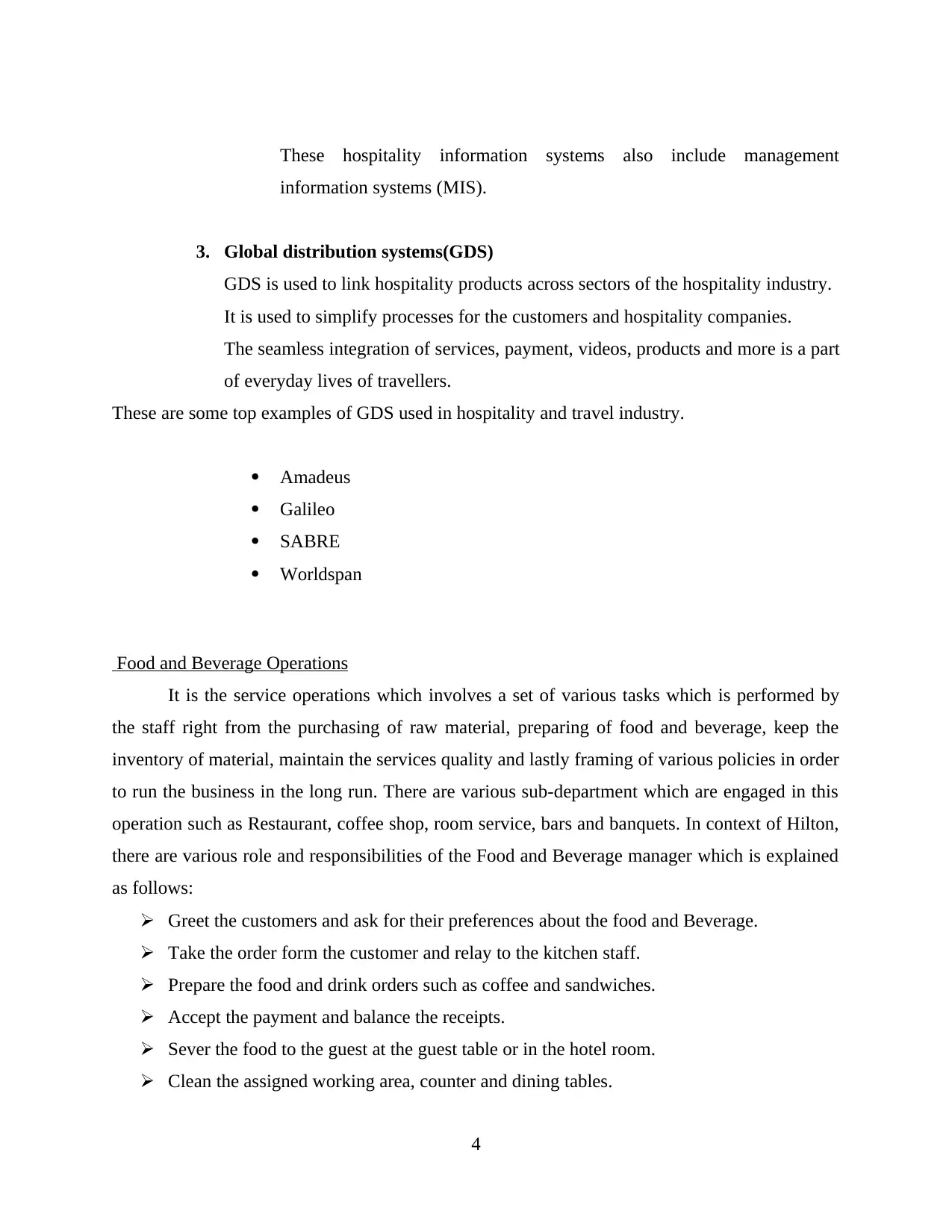
These hospitality information systems also include management
information systems (MIS).
3. Global distribution systems(GDS)
GDS is used to link hospitality products across sectors of the hospitality industry.
It is used to simplify processes for the customers and hospitality companies.
The seamless integration of services, payment, videos, products and more is a part
of everyday lives of travellers.
These are some top examples of GDS used in hospitality and travel industry.
Amadeus
Galileo
SABRE
Worldspan
Food and Beverage Operations
It is the service operations which involves a set of various tasks which is performed by
the staff right from the purchasing of raw material, preparing of food and beverage, keep the
inventory of material, maintain the services quality and lastly framing of various policies in order
to run the business in the long run. There are various sub-department which are engaged in this
operation such as Restaurant, coffee shop, room service, bars and banquets. In context of Hilton,
there are various role and responsibilities of the Food and Beverage manager which is explained
as follows:
Greet the customers and ask for their preferences about the food and Beverage.
Take the order form the customer and relay to the kitchen staff.
Prepare the food and drink orders such as coffee and sandwiches.
Accept the payment and balance the receipts.
Sever the food to the guest at the guest table or in the hotel room.
Clean the assigned working area, counter and dining tables.
4
information systems (MIS).
3. Global distribution systems(GDS)
GDS is used to link hospitality products across sectors of the hospitality industry.
It is used to simplify processes for the customers and hospitality companies.
The seamless integration of services, payment, videos, products and more is a part
of everyday lives of travellers.
These are some top examples of GDS used in hospitality and travel industry.
Amadeus
Galileo
SABRE
Worldspan
Food and Beverage Operations
It is the service operations which involves a set of various tasks which is performed by
the staff right from the purchasing of raw material, preparing of food and beverage, keep the
inventory of material, maintain the services quality and lastly framing of various policies in order
to run the business in the long run. There are various sub-department which are engaged in this
operation such as Restaurant, coffee shop, room service, bars and banquets. In context of Hilton,
there are various role and responsibilities of the Food and Beverage manager which is explained
as follows:
Greet the customers and ask for their preferences about the food and Beverage.
Take the order form the customer and relay to the kitchen staff.
Prepare the food and drink orders such as coffee and sandwiches.
Accept the payment and balance the receipts.
Sever the food to the guest at the guest table or in the hotel room.
Clean the assigned working area, counter and dining tables.
4
⊘ This is a preview!⊘
Do you want full access?
Subscribe today to unlock all pages.

Trusted by 1+ million students worldwide
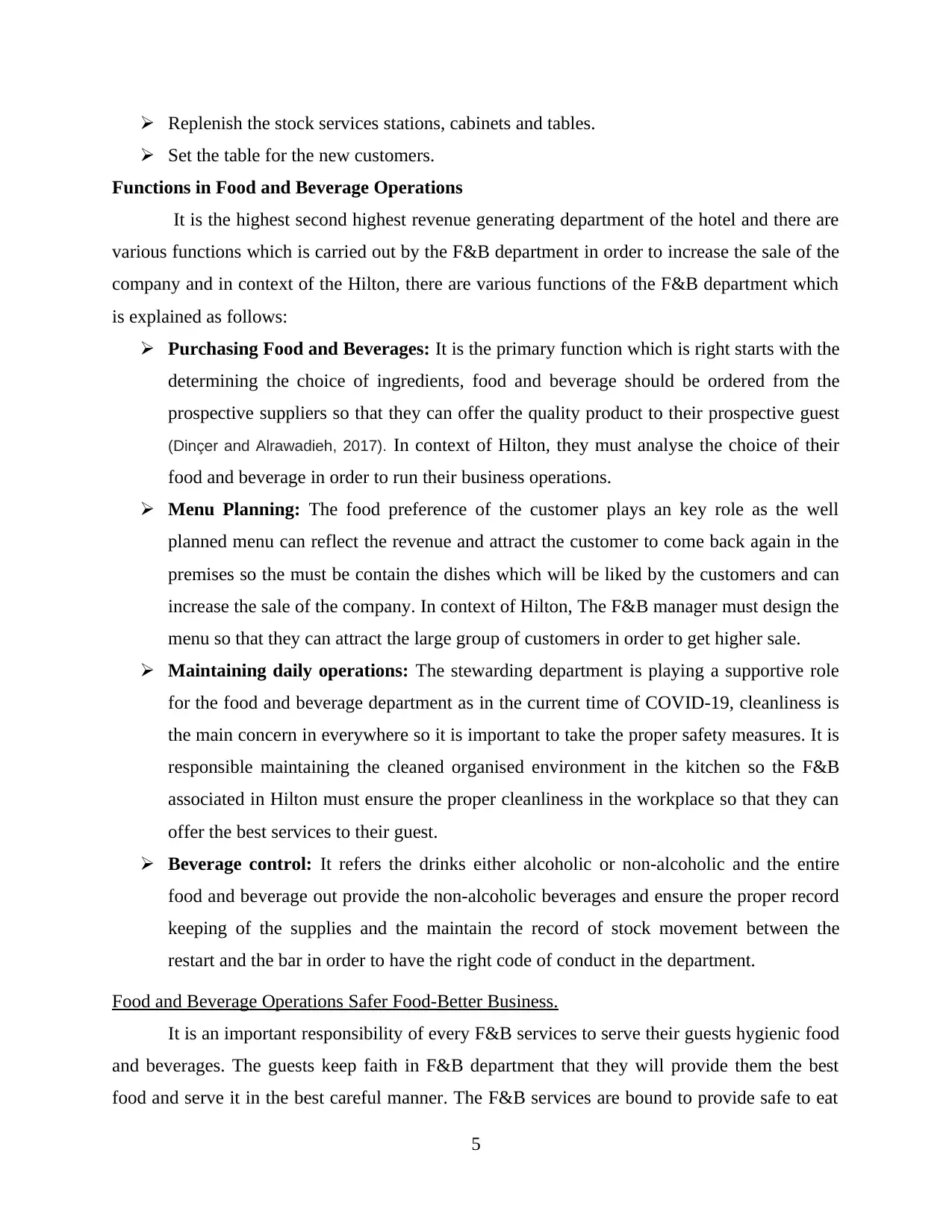
Replenish the stock services stations, cabinets and tables.
Set the table for the new customers.
Functions in Food and Beverage Operations
It is the highest second highest revenue generating department of the hotel and there are
various functions which is carried out by the F&B department in order to increase the sale of the
company and in context of the Hilton, there are various functions of the F&B department which
is explained as follows:
Purchasing Food and Beverages: It is the primary function which is right starts with the
determining the choice of ingredients, food and beverage should be ordered from the
prospective suppliers so that they can offer the quality product to their prospective guest
(Dinçer and Alrawadieh, 2017). In context of Hilton, they must analyse the choice of their
food and beverage in order to run their business operations.
Menu Planning: The food preference of the customer plays an key role as the well
planned menu can reflect the revenue and attract the customer to come back again in the
premises so the must be contain the dishes which will be liked by the customers and can
increase the sale of the company. In context of Hilton, The F&B manager must design the
menu so that they can attract the large group of customers in order to get higher sale.
Maintaining daily operations: The stewarding department is playing a supportive role
for the food and beverage department as in the current time of COVID-19, cleanliness is
the main concern in everywhere so it is important to take the proper safety measures. It is
responsible maintaining the cleaned organised environment in the kitchen so the F&B
associated in Hilton must ensure the proper cleanliness in the workplace so that they can
offer the best services to their guest.
Beverage control: It refers the drinks either alcoholic or non-alcoholic and the entire
food and beverage out provide the non-alcoholic beverages and ensure the proper record
keeping of the supplies and the maintain the record of stock movement between the
restart and the bar in order to have the right code of conduct in the department.
Food and Beverage Operations Safer Food-Better Business.
It is an important responsibility of every F&B services to serve their guests hygienic food
and beverages. The guests keep faith in F&B department that they will provide them the best
food and serve it in the best careful manner. The F&B services are bound to provide safe to eat
5
Set the table for the new customers.
Functions in Food and Beverage Operations
It is the highest second highest revenue generating department of the hotel and there are
various functions which is carried out by the F&B department in order to increase the sale of the
company and in context of the Hilton, there are various functions of the F&B department which
is explained as follows:
Purchasing Food and Beverages: It is the primary function which is right starts with the
determining the choice of ingredients, food and beverage should be ordered from the
prospective suppliers so that they can offer the quality product to their prospective guest
(Dinçer and Alrawadieh, 2017). In context of Hilton, they must analyse the choice of their
food and beverage in order to run their business operations.
Menu Planning: The food preference of the customer plays an key role as the well
planned menu can reflect the revenue and attract the customer to come back again in the
premises so the must be contain the dishes which will be liked by the customers and can
increase the sale of the company. In context of Hilton, The F&B manager must design the
menu so that they can attract the large group of customers in order to get higher sale.
Maintaining daily operations: The stewarding department is playing a supportive role
for the food and beverage department as in the current time of COVID-19, cleanliness is
the main concern in everywhere so it is important to take the proper safety measures. It is
responsible maintaining the cleaned organised environment in the kitchen so the F&B
associated in Hilton must ensure the proper cleanliness in the workplace so that they can
offer the best services to their guest.
Beverage control: It refers the drinks either alcoholic or non-alcoholic and the entire
food and beverage out provide the non-alcoholic beverages and ensure the proper record
keeping of the supplies and the maintain the record of stock movement between the
restart and the bar in order to have the right code of conduct in the department.
Food and Beverage Operations Safer Food-Better Business.
It is an important responsibility of every F&B services to serve their guests hygienic food
and beverages. The guests keep faith in F&B department that they will provide them the best
food and serve it in the best careful manner. The F&B services are bound to provide safe to eat
5
Paraphrase This Document
Need a fresh take? Get an instant paraphrase of this document with our AI Paraphraser
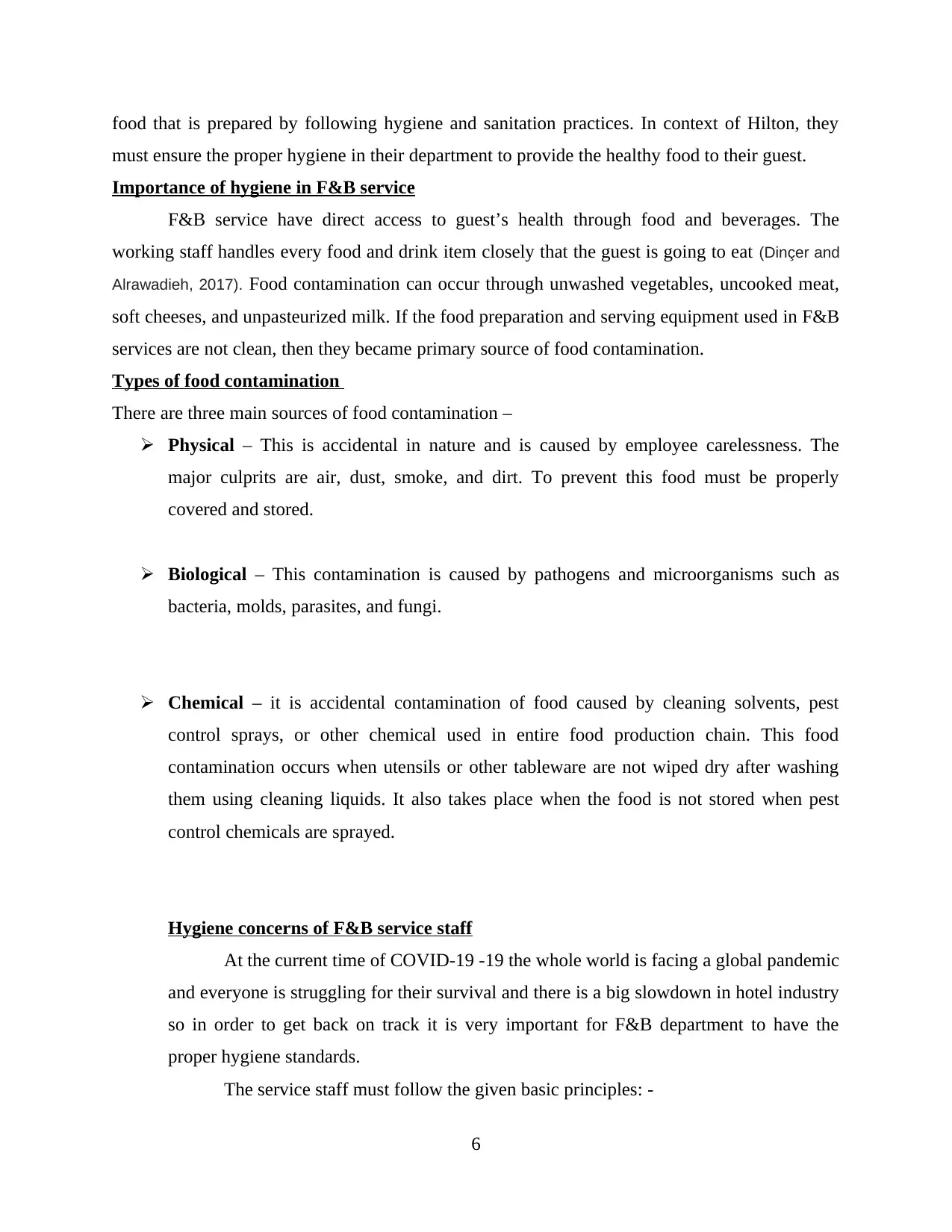
food that is prepared by following hygiene and sanitation practices. In context of Hilton, they
must ensure the proper hygiene in their department to provide the healthy food to their guest.
Importance of hygiene in F&B service
F&B service have direct access to guest’s health through food and beverages. The
working staff handles every food and drink item closely that the guest is going to eat (Dinçer and
Alrawadieh, 2017). Food contamination can occur through unwashed vegetables, uncooked meat,
soft cheeses, and unpasteurized milk. If the food preparation and serving equipment used in F&B
services are not clean, then they became primary source of food contamination.
Types of food contamination
There are three main sources of food contamination –
Physical – This is accidental in nature and is caused by employee carelessness. The
major culprits are air, dust, smoke, and dirt. To prevent this food must be properly
covered and stored.
Biological – This contamination is caused by pathogens and microorganisms such as
bacteria, molds, parasites, and fungi.
Chemical – it is accidental contamination of food caused by cleaning solvents, pest
control sprays, or other chemical used in entire food production chain. This food
contamination occurs when utensils or other tableware are not wiped dry after washing
them using cleaning liquids. It also takes place when the food is not stored when pest
control chemicals are sprayed.
Hygiene concerns of F&B service staff
At the current time of COVID-19 -19 the whole world is facing a global pandemic
and everyone is struggling for their survival and there is a big slowdown in hotel industry
so in order to get back on track it is very important for F&B department to have the
proper hygiene standards.
The service staff must follow the given basic principles: -
6
must ensure the proper hygiene in their department to provide the healthy food to their guest.
Importance of hygiene in F&B service
F&B service have direct access to guest’s health through food and beverages. The
working staff handles every food and drink item closely that the guest is going to eat (Dinçer and
Alrawadieh, 2017). Food contamination can occur through unwashed vegetables, uncooked meat,
soft cheeses, and unpasteurized milk. If the food preparation and serving equipment used in F&B
services are not clean, then they became primary source of food contamination.
Types of food contamination
There are three main sources of food contamination –
Physical – This is accidental in nature and is caused by employee carelessness. The
major culprits are air, dust, smoke, and dirt. To prevent this food must be properly
covered and stored.
Biological – This contamination is caused by pathogens and microorganisms such as
bacteria, molds, parasites, and fungi.
Chemical – it is accidental contamination of food caused by cleaning solvents, pest
control sprays, or other chemical used in entire food production chain. This food
contamination occurs when utensils or other tableware are not wiped dry after washing
them using cleaning liquids. It also takes place when the food is not stored when pest
control chemicals are sprayed.
Hygiene concerns of F&B service staff
At the current time of COVID-19 -19 the whole world is facing a global pandemic
and everyone is struggling for their survival and there is a big slowdown in hotel industry
so in order to get back on track it is very important for F&B department to have the
proper hygiene standards.
The service staff must follow the given basic principles: -
6
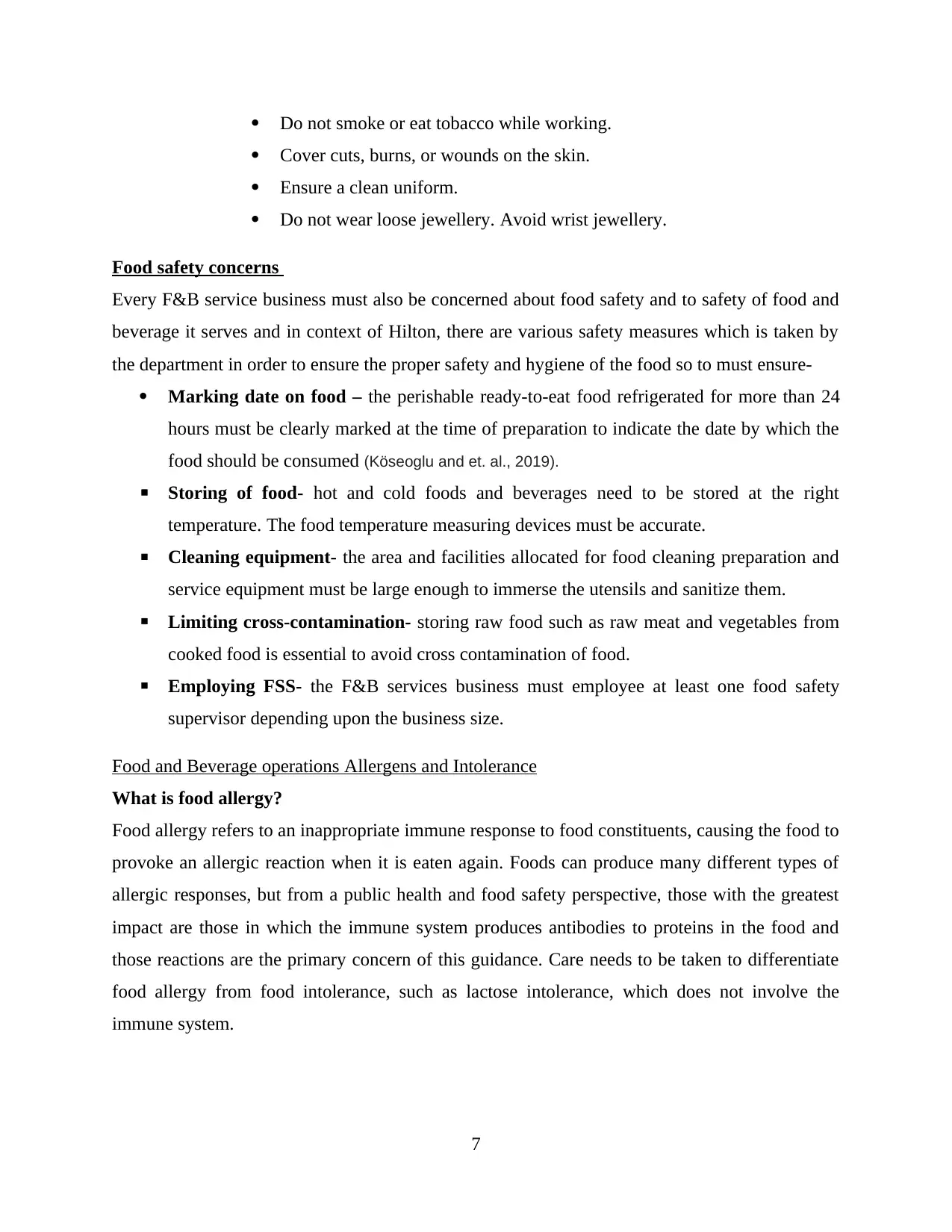
Do not smoke or eat tobacco while working.
Cover cuts, burns, or wounds on the skin.
Ensure a clean uniform.
Do not wear loose jewellery. Avoid wrist jewellery.
Food safety concerns
Every F&B service business must also be concerned about food safety and to safety of food and
beverage it serves and in context of Hilton, there are various safety measures which is taken by
the department in order to ensure the proper safety and hygiene of the food so to must ensure-
Marking date on food – the perishable ready-to-eat food refrigerated for more than 24
hours must be clearly marked at the time of preparation to indicate the date by which the
food should be consumed (Köseoglu and et. al., 2019).
Storing of food- hot and cold foods and beverages need to be stored at the right
temperature. The food temperature measuring devices must be accurate.
Cleaning equipment- the area and facilities allocated for food cleaning preparation and
service equipment must be large enough to immerse the utensils and sanitize them.
Limiting cross-contamination- storing raw food such as raw meat and vegetables from
cooked food is essential to avoid cross contamination of food.
Employing FSS- the F&B services business must employee at least one food safety
supervisor depending upon the business size.
Food and Beverage operations Allergens and Intolerance
What is food allergy?
Food allergy refers to an inappropriate immune response to food constituents, causing the food to
provoke an allergic reaction when it is eaten again. Foods can produce many different types of
allergic responses, but from a public health and food safety perspective, those with the greatest
impact are those in which the immune system produces antibodies to proteins in the food and
those reactions are the primary concern of this guidance. Care needs to be taken to differentiate
food allergy from food intolerance, such as lactose intolerance, which does not involve the
immune system.
7
Cover cuts, burns, or wounds on the skin.
Ensure a clean uniform.
Do not wear loose jewellery. Avoid wrist jewellery.
Food safety concerns
Every F&B service business must also be concerned about food safety and to safety of food and
beverage it serves and in context of Hilton, there are various safety measures which is taken by
the department in order to ensure the proper safety and hygiene of the food so to must ensure-
Marking date on food – the perishable ready-to-eat food refrigerated for more than 24
hours must be clearly marked at the time of preparation to indicate the date by which the
food should be consumed (Köseoglu and et. al., 2019).
Storing of food- hot and cold foods and beverages need to be stored at the right
temperature. The food temperature measuring devices must be accurate.
Cleaning equipment- the area and facilities allocated for food cleaning preparation and
service equipment must be large enough to immerse the utensils and sanitize them.
Limiting cross-contamination- storing raw food such as raw meat and vegetables from
cooked food is essential to avoid cross contamination of food.
Employing FSS- the F&B services business must employee at least one food safety
supervisor depending upon the business size.
Food and Beverage operations Allergens and Intolerance
What is food allergy?
Food allergy refers to an inappropriate immune response to food constituents, causing the food to
provoke an allergic reaction when it is eaten again. Foods can produce many different types of
allergic responses, but from a public health and food safety perspective, those with the greatest
impact are those in which the immune system produces antibodies to proteins in the food and
those reactions are the primary concern of this guidance. Care needs to be taken to differentiate
food allergy from food intolerance, such as lactose intolerance, which does not involve the
immune system.
7
⊘ This is a preview!⊘
Do you want full access?
Subscribe today to unlock all pages.

Trusted by 1+ million students worldwide
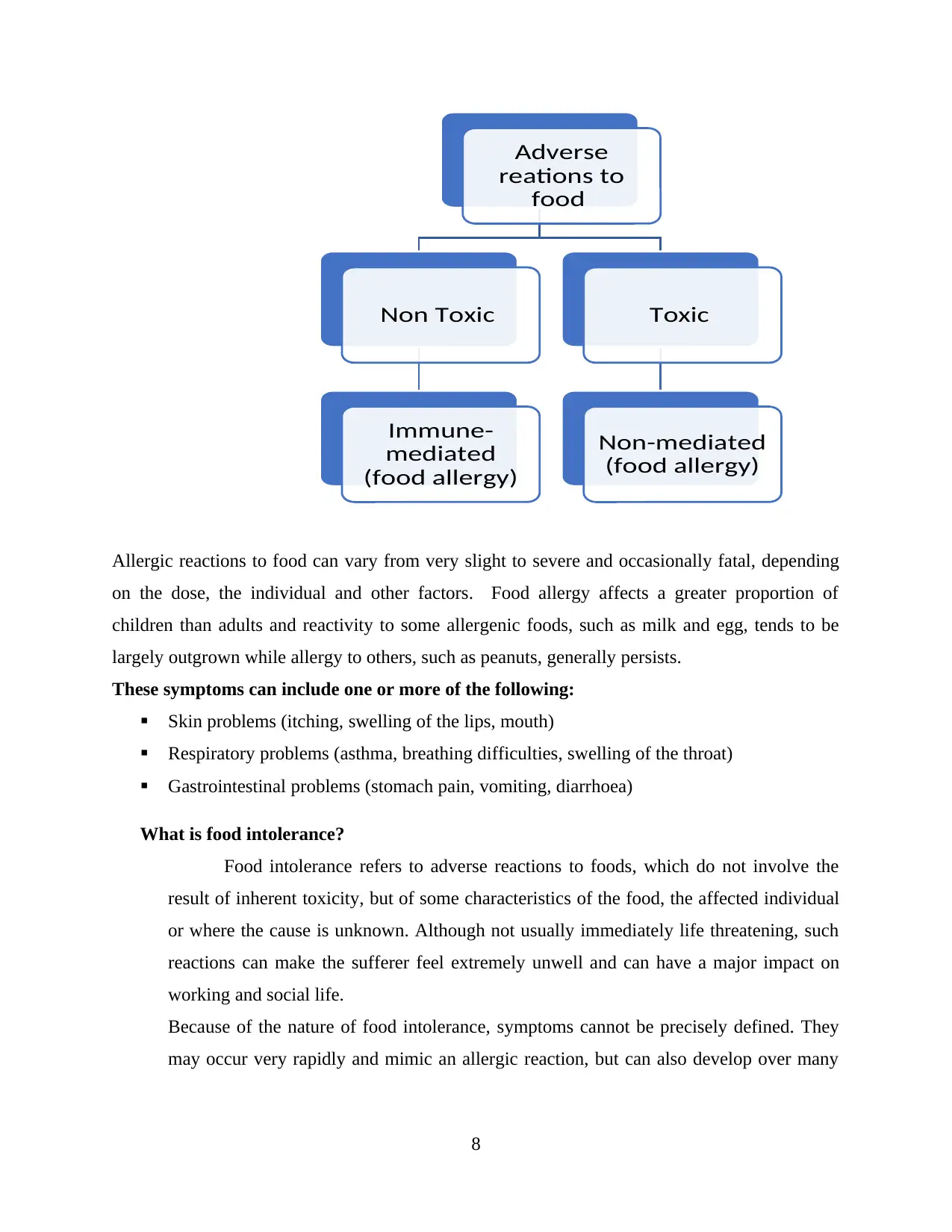
Allergic reactions to food can vary from very slight to severe and occasionally fatal, depending
on the dose, the individual and other factors. Food allergy affects a greater proportion of
children than adults and reactivity to some allergenic foods, such as milk and egg, tends to be
largely outgrown while allergy to others, such as peanuts, generally persists.
These symptoms can include one or more of the following:
Skin problems (itching, swelling of the lips, mouth)
Respiratory problems (asthma, breathing difficulties, swelling of the throat)
Gastrointestinal problems (stomach pain, vomiting, diarrhoea)
What is food intolerance?
Food intolerance refers to adverse reactions to foods, which do not involve the
result of inherent toxicity, but of some characteristics of the food, the affected individual
or where the cause is unknown. Although not usually immediately life threatening, such
reactions can make the sufferer feel extremely unwell and can have a major impact on
working and social life.
Because of the nature of food intolerance, symptoms cannot be precisely defined. They
may occur very rapidly and mimic an allergic reaction, but can also develop over many
8
Adverse
reations to
food
Non Toxic
Immune-
mediated
(food allergy)
Toxic
Non-mediated
(food allergy)
on the dose, the individual and other factors. Food allergy affects a greater proportion of
children than adults and reactivity to some allergenic foods, such as milk and egg, tends to be
largely outgrown while allergy to others, such as peanuts, generally persists.
These symptoms can include one or more of the following:
Skin problems (itching, swelling of the lips, mouth)
Respiratory problems (asthma, breathing difficulties, swelling of the throat)
Gastrointestinal problems (stomach pain, vomiting, diarrhoea)
What is food intolerance?
Food intolerance refers to adverse reactions to foods, which do not involve the
result of inherent toxicity, but of some characteristics of the food, the affected individual
or where the cause is unknown. Although not usually immediately life threatening, such
reactions can make the sufferer feel extremely unwell and can have a major impact on
working and social life.
Because of the nature of food intolerance, symptoms cannot be precisely defined. They
may occur very rapidly and mimic an allergic reaction, but can also develop over many
8
Adverse
reations to
food
Non Toxic
Immune-
mediated
(food allergy)
Toxic
Non-mediated
(food allergy)
Paraphrase This Document
Need a fresh take? Get an instant paraphrase of this document with our AI Paraphraser
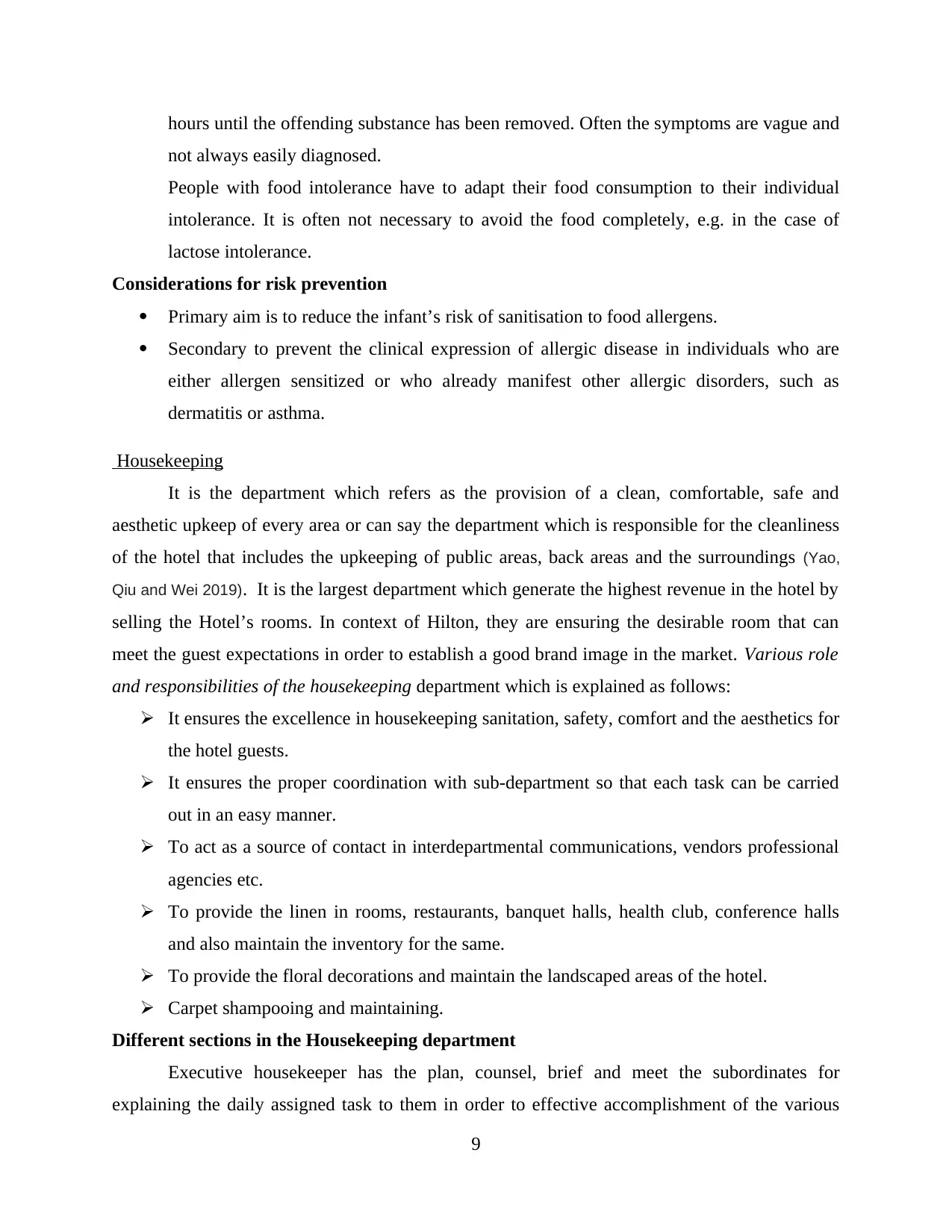
hours until the offending substance has been removed. Often the symptoms are vague and
not always easily diagnosed.
People with food intolerance have to adapt their food consumption to their individual
intolerance. It is often not necessary to avoid the food completely, e.g. in the case of
lactose intolerance.
Considerations for risk prevention
Primary aim is to reduce the infant’s risk of sanitisation to food allergens.
Secondary to prevent the clinical expression of allergic disease in individuals who are
either allergen sensitized or who already manifest other allergic disorders, such as
dermatitis or asthma.
Housekeeping
It is the department which refers as the provision of a clean, comfortable, safe and
aesthetic upkeep of every area or can say the department which is responsible for the cleanliness
of the hotel that includes the upkeeping of public areas, back areas and the surroundings (Yao,
Qiu and Wei 2019). It is the largest department which generate the highest revenue in the hotel by
selling the Hotel’s rooms. In context of Hilton, they are ensuring the desirable room that can
meet the guest expectations in order to establish a good brand image in the market. Various role
and responsibilities of the housekeeping department which is explained as follows:
It ensures the excellence in housekeeping sanitation, safety, comfort and the aesthetics for
the hotel guests.
It ensures the proper coordination with sub-department so that each task can be carried
out in an easy manner.
To act as a source of contact in interdepartmental communications, vendors professional
agencies etc.
To provide the linen in rooms, restaurants, banquet halls, health club, conference halls
and also maintain the inventory for the same.
To provide the floral decorations and maintain the landscaped areas of the hotel.
Carpet shampooing and maintaining.
Different sections in the Housekeeping department
Executive housekeeper has the plan, counsel, brief and meet the subordinates for
explaining the daily assigned task to them in order to effective accomplishment of the various
9
not always easily diagnosed.
People with food intolerance have to adapt their food consumption to their individual
intolerance. It is often not necessary to avoid the food completely, e.g. in the case of
lactose intolerance.
Considerations for risk prevention
Primary aim is to reduce the infant’s risk of sanitisation to food allergens.
Secondary to prevent the clinical expression of allergic disease in individuals who are
either allergen sensitized or who already manifest other allergic disorders, such as
dermatitis or asthma.
Housekeeping
It is the department which refers as the provision of a clean, comfortable, safe and
aesthetic upkeep of every area or can say the department which is responsible for the cleanliness
of the hotel that includes the upkeeping of public areas, back areas and the surroundings (Yao,
Qiu and Wei 2019). It is the largest department which generate the highest revenue in the hotel by
selling the Hotel’s rooms. In context of Hilton, they are ensuring the desirable room that can
meet the guest expectations in order to establish a good brand image in the market. Various role
and responsibilities of the housekeeping department which is explained as follows:
It ensures the excellence in housekeeping sanitation, safety, comfort and the aesthetics for
the hotel guests.
It ensures the proper coordination with sub-department so that each task can be carried
out in an easy manner.
To act as a source of contact in interdepartmental communications, vendors professional
agencies etc.
To provide the linen in rooms, restaurants, banquet halls, health club, conference halls
and also maintain the inventory for the same.
To provide the floral decorations and maintain the landscaped areas of the hotel.
Carpet shampooing and maintaining.
Different sections in the Housekeeping department
Executive housekeeper has the plan, counsel, brief and meet the subordinates for
explaining the daily assigned task to them in order to effective accomplishment of the various
9
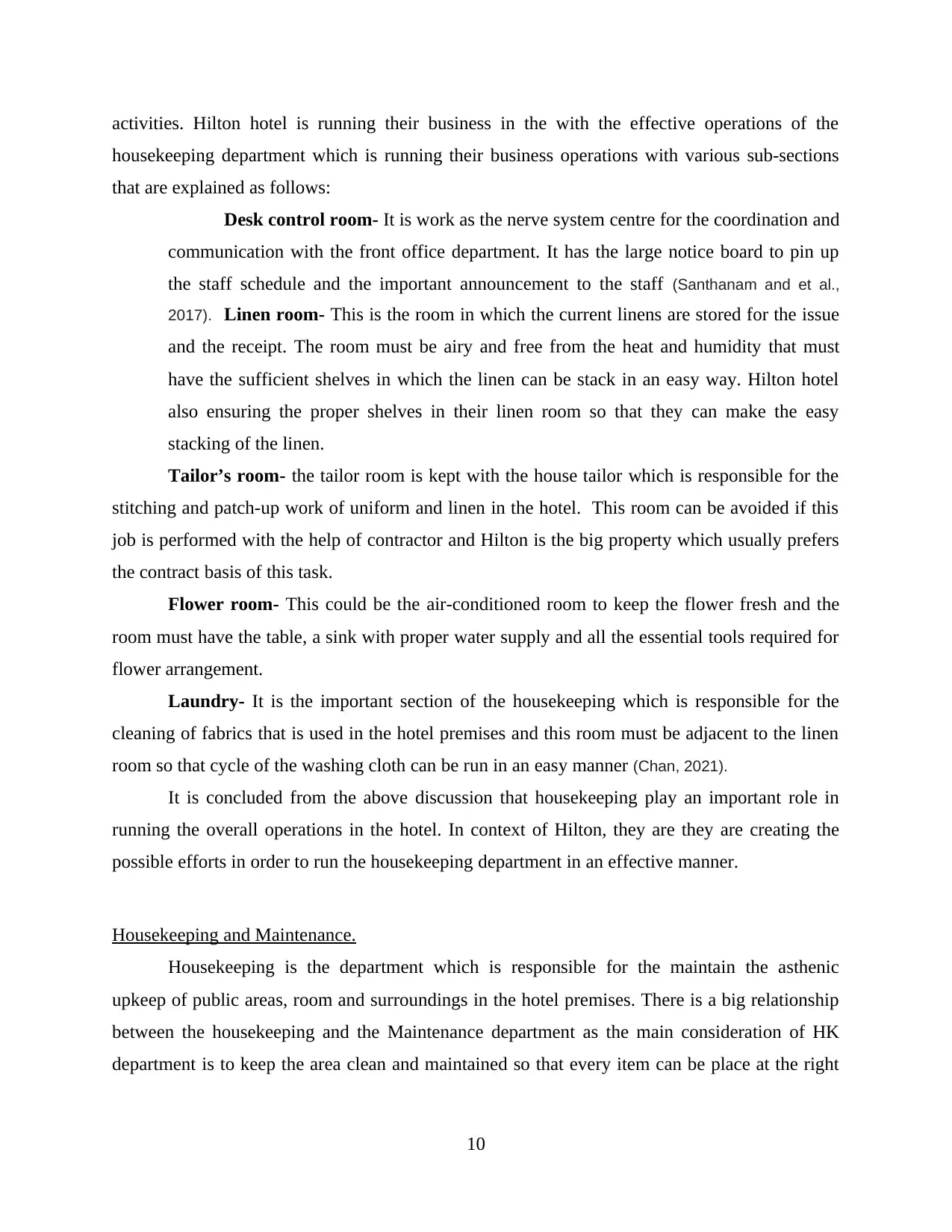
activities. Hilton hotel is running their business in the with the effective operations of the
housekeeping department which is running their business operations with various sub-sections
that are explained as follows:
Desk control room- It is work as the nerve system centre for the coordination and
communication with the front office department. It has the large notice board to pin up
the staff schedule and the important announcement to the staff (Santhanam and et al.,
2017). Linen room- This is the room in which the current linens are stored for the issue
and the receipt. The room must be airy and free from the heat and humidity that must
have the sufficient shelves in which the linen can be stack in an easy way. Hilton hotel
also ensuring the proper shelves in their linen room so that they can make the easy
stacking of the linen.
Tailor’s room- the tailor room is kept with the house tailor which is responsible for the
stitching and patch-up work of uniform and linen in the hotel. This room can be avoided if this
job is performed with the help of contractor and Hilton is the big property which usually prefers
the contract basis of this task.
Flower room- This could be the air-conditioned room to keep the flower fresh and the
room must have the table, a sink with proper water supply and all the essential tools required for
flower arrangement.
Laundry- It is the important section of the housekeeping which is responsible for the
cleaning of fabrics that is used in the hotel premises and this room must be adjacent to the linen
room so that cycle of the washing cloth can be run in an easy manner (Chan, 2021).
It is concluded from the above discussion that housekeeping play an important role in
running the overall operations in the hotel. In context of Hilton, they are they are creating the
possible efforts in order to run the housekeeping department in an effective manner.
Housekeeping and Maintenance.
Housekeeping is the department which is responsible for the maintain the asthenic
upkeep of public areas, room and surroundings in the hotel premises. There is a big relationship
between the housekeeping and the Maintenance department as the main consideration of HK
department is to keep the area clean and maintained so that every item can be place at the right
10
housekeeping department which is running their business operations with various sub-sections
that are explained as follows:
Desk control room- It is work as the nerve system centre for the coordination and
communication with the front office department. It has the large notice board to pin up
the staff schedule and the important announcement to the staff (Santhanam and et al.,
2017). Linen room- This is the room in which the current linens are stored for the issue
and the receipt. The room must be airy and free from the heat and humidity that must
have the sufficient shelves in which the linen can be stack in an easy way. Hilton hotel
also ensuring the proper shelves in their linen room so that they can make the easy
stacking of the linen.
Tailor’s room- the tailor room is kept with the house tailor which is responsible for the
stitching and patch-up work of uniform and linen in the hotel. This room can be avoided if this
job is performed with the help of contractor and Hilton is the big property which usually prefers
the contract basis of this task.
Flower room- This could be the air-conditioned room to keep the flower fresh and the
room must have the table, a sink with proper water supply and all the essential tools required for
flower arrangement.
Laundry- It is the important section of the housekeeping which is responsible for the
cleaning of fabrics that is used in the hotel premises and this room must be adjacent to the linen
room so that cycle of the washing cloth can be run in an easy manner (Chan, 2021).
It is concluded from the above discussion that housekeeping play an important role in
running the overall operations in the hotel. In context of Hilton, they are they are creating the
possible efforts in order to run the housekeeping department in an effective manner.
Housekeeping and Maintenance.
Housekeeping is the department which is responsible for the maintain the asthenic
upkeep of public areas, room and surroundings in the hotel premises. There is a big relationship
between the housekeeping and the Maintenance department as the main consideration of HK
department is to keep the area clean and maintained so that every item can be place at the right
10
⊘ This is a preview!⊘
Do you want full access?
Subscribe today to unlock all pages.

Trusted by 1+ million students worldwide
1 out of 17
Related Documents
Your All-in-One AI-Powered Toolkit for Academic Success.
+13062052269
info@desklib.com
Available 24*7 on WhatsApp / Email
![[object Object]](/_next/static/media/star-bottom.7253800d.svg)
Unlock your academic potential
Copyright © 2020–2026 A2Z Services. All Rights Reserved. Developed and managed by ZUCOL.





